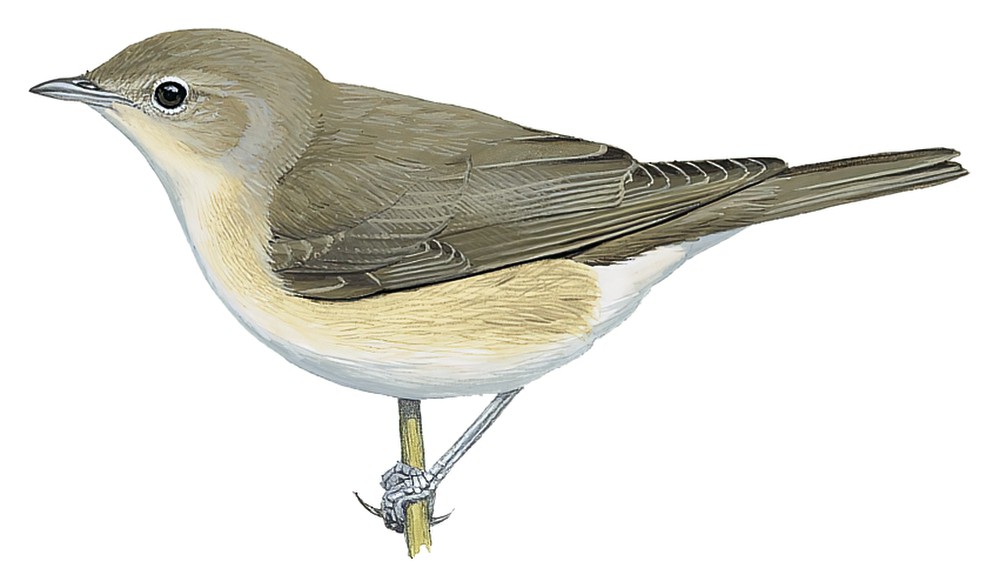Garden Warbler / Sylvia borin

Garden Warbler
SCI Name:
Protonym: Motacilla Borin TablePlanchesEnlum. p.35
Taxonomy: Passeriformes / Sylviidae / Sylvia
Taxonomy Code: garwar1
Type Locality: France.
Author: Boddaert
Publish Year: 1783
IUCN Status: Least Concern
DEFINITIONS
SYLVIA
(Sylviidae; Ϯ Eurasian Blackcap S. atricapilla) Mod. L. sylvia woodland sprite < L. silva or sylva woodland (cf. Motacilla sylvia Linnaeus, 1766 (considered unidentifiable, but perhaps the Common Whitethroat)); "SYLVIA. Gens tenuirostris, insectivora, canora, garrula, inquieta, arboribus insidens, strigi illudens, migrans, saltitans nec ambulans, vocem nullam edens dum volat. 227. SYLVIA LUSCINIA. ... Ital. Rossignolo. Germ. Nachtigall. ... 228. SYLVIA CURRUCA. ... Ital. Bianchetto. Germ. Spottvogel. ... 229. SYLVIA ATRICAPILLA. ... Ital. Capo nero. Germ. Schwarzplatl. ... 230. SYLVIA OENANTHE. ... Ital. Cullo bianco. Germ. Steinschwazer. ... 231. SYLVIA RUBECULA. ... Ital. Petto rosso, Pitardello, Petuzzo. Germ. Rothkehlchen, Rothkröpfl. ... 232. SYLVIA PHOENICURUS. ... Ital. Scorsolato, Quarossolo. German. Rothschwänzchen, Waldrothschweifl. ... 233. SYLVIA TITHYS. ... Ital. Moretto. Germ. Hausrothschweifl. ... 234. SYLVIA ZYA. ... 235. SYLVIA SCHOENOBAENUS? ... Ital. Grisato. ... 236. SYLVIA MUSCIPETA. ... Ital. Grisatto bastardo. ... 237. SYLVIA RUBETRA. ... 238. SYLVIA TROCHILUS. ... Germ. Schmittl. ... 239. SYLVIA TROGLODYTES. ... Ital. Reatolo. Germ. Königerl, Zaunschlupferl. ... 240. SYVIA REGULUS. ... Germ. Goldhähnlein, Zaunkönig." (Scopoli 1769). "When the genus Sylvia, containing upwards of two hundred and fifty species, shall have been properly studied, it will be found practicable to divide it into several more sections, subgenera, and even perhaps genera. This bird [Sylvia palmarum], along with many other North American species, will constitute a highly natural group, very distinct from the true Sylvia, of which S. atricapilla may be considered as the type" (Bonaparte 1828); “This genus, proposed by Scopoli ... has no type designated by the author. Of later writers, Swainson in 1836 designated Sylvia hippolais (the Icterine Warbler), Gray in 1840 Sylvia melanocephala (the Sardinian Warbler), and Seebohm in 1881 Sylvia cinerea (the Whitethroat) as the types. As these three species are not to be found among those included by Scopoli in his original list of species, it is obvious that another type must be found. Motacilla sylvia Linnaeus, 1766 (= Sylvia communis Lath.), which might be regarded as the type by tautonymy, cannot be taken into consideration; it is not included in Scopoli’s original list of the members of the genus, and the identification of Motacilla sylvia with Sylvia communis is very doubtful. The Committee suggest that Sylvia curruca (Linn.) should henceforth be regarded as the type of this genus” (BOU 1915); "Sylvia Scopoli, 1769, Annus I Hist. Nat., p. 154. Type, by subsequent designation (Bonaparte, 1828, Amer. Ornith., 2, p. 17), Motacilla atricapilla Linnaeus." (Watson in Peters 1986, XI, 270).
Var. Silvia, Silvya, Slyvia, Sylcia.
Synon. Adophoneus, Adornis, Aegithalopsis, Alsoecus, Atraphornis, Communis, Corytholaea, Cuphopterus, Cuphornis, Curruca, Dagela, Epilais, Erythroleuca, Ficedula, Horizorhinus, Hortensis, Lioptilornis, Lioptilus, Melizophilus, Melophilus, Monachus, Nisoria, Parisoma, Philacantha, Philydra, Pseudoalcippe, Pyrophthalma, Sterparola, Thamnodus, Trochilus.
sylvia
Mod. L. sylvia woodland sprite, little bird, warbler < L. silva woodland.
● Roman myth. Rhea Silvia, wife to the river god Tiberinus, and mother of the twins Romulus and Remus, founders of Rome; alluding to watery habitats (subsp. Cisticola erythrops, Tanysiptera).
● Roman myth. Silvia, goddess of the forests (syn. Peneothello bimaculata vicaria).
● "99. MOTACILLA. ... Sylvia. 9. M. supra cinerea, subtus alba, rectrice prima longitudinaliter dimidiato albo, secunda apice alba. Fn. svec. 228. Habitat in Europa." (Linnaeus 1758) (?syn. Sylvia curruca).
borin
Local Italian (Genoese) name Borin for a type of warbler (“from L. bos, ox; because the bird originally so called was reputed to keep close to oxen” (Macleod 1954)); "LA PETITE FAUVETTE. ... CURRUCA MINOR. ... Les Génois, BORIN" (Brisson 1760; based on "Borin Genuensibus" of Aldrovandus 1599-1603); "2. Passerinette BUFF. IX. p. 178. Petite fauvette, BRISS. Ornith. III. p. 374. Motacilla Borin, mihi LINN. 114. o." (Boddaert 1783) (Sylvia).
SUBSPECIES
Garden Warbler (borin)
SCI Name: Sylvia borin borin
borin
Local Italian (Genoese) name Borin for a type of warbler (“from L. bos, ox; because the bird originally so called was reputed to keep close to oxen” (Macleod 1954)); "LA PETITE FAUVETTE. ... CURRUCA MINOR. ... Les Génois, BORIN" (Brisson 1760; based on "Borin Genuensibus" of Aldrovandus 1599-1603); "2. Passerinette BUFF. IX. p. 178. Petite fauvette, BRISS. Ornith. III. p. 374. Motacilla Borin, mihi LINN. 114. o." (Boddaert 1783) (Sylvia).
Garden Warbler (woodwardi)
SCI Name: Sylvia borin woodwardi
woodwardi
• Bernard Henry Woodward (1846-1916) British immigrant to Australia, son of Prof. S. P. Woodward, assayer, Curator of Perth Mus., Western Australia 1889-1916 (Amytornis, subsp. Anthochaera carunculata, Colluricincla, syn. Dromaius novaehollandiae, syn. Eudyptula minor novaehollandiae, subsp. Mirafra javanica, syn. Porphyrio melanotus).
• Dr Sir Arthur Smith Woodward (1864-1944) English palaeontologist involved in the Piltdown Man hoax 1912 (‡Buteo).
• Revd. Richard Blake Woodward (1847-1919) and his brother Revd. John Deverell Stewart Woodward (1849-1919) English missionaries to Natal, naturalists, explorers, collectors, emigrated to Australia 1905 (Paul Scofield in litt.) (subsp. Cryptolybia olivacea, subsp. Sylvia borin).
UPPERCASE: current genus
Uppercase first letter: generic synonym
● and ● See: generic homonyms
lowercase: species and subspecies
●: early names, variants, mispellings
‡: extinct
†: type species
Gr.: ancient Greek
L.: Latin
<: derived from
syn: synonym of
/: separates historical and modern geographic names
ex: based on
TL: type locality
OD: original diagnosis (genus) or original description (species)












